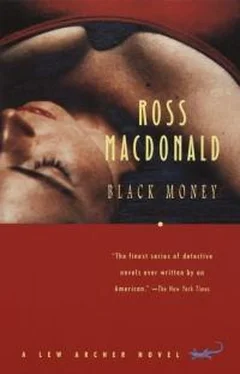“I don’t know whether it’s true or not, señora . The killer hasn’t been run down.”
Bosch put in: “You said you doubted that it was a gangster shooting.”
The woman took comfort from this. “Of course, my son had nothing to do with gangsters. He was a fine man, a great man. If he had lived, he would have become our foreign minister, perhaps our president.”
She was spinning a web of fantasy, to veil any possible truth that might emerge. I didn’t feel like arguing with her grief, but I said: “Did you know Leo Spillman?”
“Who?”
“Leo Spillman.”
“No. Who is Leo Spillman?”
“A Las Vegas gambler. Your son was an associate of his. Didn’t he ever mention Spillman to you?”
She shook her head. I could see no indication that she was lying. But there were sorrowful depths in her black eyes, depths below depths, like strata of history older than the Incas.
“You believe that Leo Spillman killed my son, is that it?”
“I thought so until yesterday. Pedro embezzled a lot of money from Spillman.”
“Embezzled?”
She appealed to Bosch. “ Que está diciendo ?”
He answered her reluctantly: “Mr. Archer thinks your son stole some money from Mr. Spillman. I don’t know anything about it.”
Her breath hissed through her gold teeth: “ Estas diciendo mentiras. Pedro hizo su fortuna en Wall Street .”
“She says you’re a liar,” Bosch told me with a polite pleasure.
“Thanks, I got the message.”
I said to her: “I’m not bringing up these matters for fun, señora . If we want to find out what happened to your son, we have to go into the question of his money. I think he was killed for his money.”
“By his new wife?” she said on a rising note.
“That’s a good question. The answer has to be no, but I’m interested in your reasons for asking it.”
“I know women, and I know my son. He was capable of a grand – a great love. Such men are always deluded by their women.”
“Do you know that Pedro was?”
“He suspected it himself. He wrote me about his fear that the woman he wished to marry did not love him. I intend to speak to the woman.”
“It wouldn’t be a good idea,” I said. “Within the last four days she’s lost both her mother and her husband. Let her be, señora .”
She persisted stolidly. “I have lost more than her – than she. I wish to speak to her. I will pay you well to take me to her.”
“Sorry. I can’t do it.”
She rose abruptly. “Then you are wasting my time.”
She moved to the door and held it open for us. I was just as glad to go. I’d found out all I was likely to, really all I needed, and I wanted no part of her black money or the black mourning that went with it.
“You were pretty rough on her.” Bosch said in the elevator. “She seemed quite innocent and naive to me.”
“She can afford to be. It’s pretty clear her husband’s the wheeler-dealer. He’s latched onto her and her money, and the U.S. government will never see a penny of it.”
“I don’t understand. What did you mean when you said Pedro was killed for his money? His mother certainly didn’t kill him.”
“No, and whoever did was probably unaware that the money had passed to her.”
“That leaves the field wide open, doesn’t it?”
But Allan Bosch was a sensitive man, and he may have intuited the direction my mind was moving in. When we stepped out of the elevator he said good-bye and started away like a sprinter.
“I haven’t finished with you, Allan.”
“Oh? I wasn’t much help, I’m afraid. I thought we’d have a chance to talk to the woman.”
“We had our chance. She gave out more than I thought she would. Now I want another chance to talk to you.”
I steered him into the bar and maneuvered him into the inside seat in a padded booth. He’d have to climb over me to get away.
I ordered a couple of gin-and-tonics. Bosch insisted on paying for his own.
“What is there left for us to talk about?” he said rather morosely.
“Love and money. And Professor Tappinger and his big mistake at Illinois. Why do you suppose he goes on paying for it twelve years after the event?”
“I have no idea.”
“He wouldn’t be repeating it, would he?”
“I don’t quite know what you’re getting at.”
Bosch began to scratch the back of his head. “Taps is happily married. He has three children.”
“Children aren’t always a deterrent. In fact I’ve known men who turned against their children because the kids reminded them that they weren’t young themselves. As for the Tappingers’ marriage, it’s close to the breaking point. She’s a desperate woman.”
“Nonsense. Bess is a darling.”
“But not his darling,” I said. “I wonder if he’s found another darling among his students.”
“Of course not. He doesn’t fool around with students.”
“He did once, you tell me–”
“I shouldn’t have.”
“And it’s a pattern of behavior that tends to repeat itself. I’ve had some experience in my work with men and women who can’t grow up, and can’t bear to grow old. They keep trying to renew themselves with younger and younger partners.”
The young man’s face puckered in distaste. “All that may be true. It has nothing to do with Taps, and frankly I find the topic slightly disgusting.”
“It isn’t pleasant for me, either. I like Tappinger, and he’s treated me well. But sometimes we have to face up to unpleasant facts, even about people we like.”
“You’re not dealing in facts. You’re simply speculating on the basis of something that happened twelve years ago.”
“Are you sure it isn’t still going on? Seven years ago, you tell me, Tappinger brought a girl freshman here to see a play. Were there other students in the party?”
“I don’t believe so.”
“Is it common practice for a professor to bring a girl student, a freshman, sixty or seventy miles to see a play?”
“It could be. I don’t know. Anyway, Bess was with them.”
“Why didn’t you tell me that before?”
“I didn’t realize it was an issue,” he said with a trace of irony. “Professor Tappinger is not a sexual psychopath, you know. He doesn’t require twenty-four-hour-a-day chaperonage.”
“I hope he doesn’t. You say you talked to the girl. Did she have anything to say about Tappinger?”
“I don’t remember. It was a long time ago.”
“Did you see them together?”
“Yes. In fact the three of them came to my place for dinner and then we all went to the play.”
“How did Tappinger and the girl act toward each other?”
“They seemed to be fond of each other.”
For a moment his face opened wide – he’d remembered something – and then it closed up tight. He half rose out of his chair. “Look here, I don’t know what you’re getting at–”
“Of course you know what I’m getting at. Did they behave like lovers?”
Bosch answered slowly and carefully: “I don’t quite get the implications of that question, Mr. Archer. And I don’t see its relevance to the present. After all, we’re talking about seven years ago.”
“There have been three murders in those seven years, all of them connected with Ginny Fablon. Her father and mother and husband have all been killed.”
“Good Lord, you’re not blaming Taps?”
“It’s too early to say. But you can be sure these questions are relevant. Were they lovers?”
“Bess seemed to believe they were. I thought she was imagining things at the time. Maybe she wasn’t, though.”
“Tell me what happened.”
“It didn’t amount to much. She got up and walked out in the middle of the play. We were all sitting together: Bess was between me and Taps and the girl was on his far side: and Bess suddenly got up and blundered out in the dark. I followed her. I thought she might be sick, and in fact she did lose her dinner in the parking lot. But it was more of a moral sickness than a physical one. She poured out a lot of stuff about Taps and the Fablon girl and how she was corrupting him–”
Читать дальше







